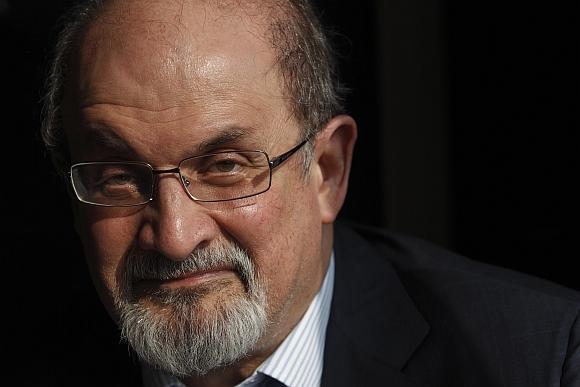 | « Back to article | Print this article |
Will HE be the next Chetan Bhagat?
Debutante author Kartik Sharma, from the same alma mater as bestselling writer Chetan Bhagat, is also an investment banker by profession. But is he destined for similar success?
Eight years ago, when an IIM alumnus wrote a book on life in a call centre, the book and the author became an overnight success story.
And now we have 24-year-old Kartik Sharma, who studied at the same school as Chetan Bhagat, also hails from Delhi, is an investment banker (!) and wants to write books on subjects that will inspire and intrigue young minds.
Sharma is a chemical engineer from IIT-Delhi and holds a master's degree in finance from IIM-Ahmedabad. The young author currently works as an investment analyst at Merril Lynch in Mumbai. And he says he believes in writing books on subjects that will force people to think -- that's how he intends to give back to the society.
His first book, The Quest of the Sparrows, tells the story of an engineer who reluctantly becomes a spiritual guru to escape being a total failure. However, as time passes, he finds himself in situations that ultimately bring him back to reality and help him transform his life and those of others.
What makes the book interesting is that neither the author nor the protagonist preach how one must live one's life. Instead, The Quest of the Sparrows tries to get you to realise your true purpose and encourages you to face everyday challenges positively. According to Sharma, the sparrow is a symbol of the joy of freedom and inspires one to let go of material pursuits.
In this interview with rediff.com, the first-time author talks about how incidents from his own life inspired him to write the book, the difference between practical and theoretical spirituality and how one can pursue spirituality to experience true freedom and success.
Click NEXT to continue reading...
'I did not write with the intention of making money'
Tell us about the inspiration behind the book.
I was in Class Eight when I suddenly fell ill. My stomach would ache abnormally and even the doctors could not diagnose my condition. I had trouble eating and my health suffered. I had to be hospitalised for more than a month.
Those were the most difficult days of my life. I did not know if I was suffering from a fatal illness or whether I would live to see tomorrow. There were many questions on my mind that nobody around me could answer. I was losing self-confidence and the will to survive. I realised why they call an idle mind the devil's workshop.
That was when my dad introduced me to Sahaja Yoga, a meditation technique. As I meditated, I found answers to the questions that were bothering me.
It was a unique way to connect with my inner self. It brought me great peace and I believe it helped cure my illness in an important way. My first book is a way of thanking the Divine and sharing this goodness with the world.
You are only 24 -- it's a little unusual for one so young to write on spirituality, isn't it?
Just like you, most of my friends asked me the same question.
But I did not want to write a book for the heck of it. Nor did I want to write one with the intention of making money off it. I write because I love to. And this subject is close to my heart.
Some of the characters are based on people we come across in real life -- people who are selfish, materialistic, cynical, etc are all part of The Quest of the Sparrows. If you look around, these are character traits embedded in people, which surface in different situations.
My book doesn't preach spirituality. It's the story of many people with different goals and how a single journey impacted their lives. It's something that happens to all of us -- one incident changes your life and the lessons and experience stays with you. I did not want to change anyone's beliefs. But after the book was released many readers, young and old, have written to me about how it inspired them to evaluate how they live their lives.
'Penguin Publishers rejected the book'
What were the challenges you faced while writing the book? How did you overcome them?
The book was my father Ravi Nirmal Sharma's idea. I was in France on an international exchange programme, when he told me that he wanted to write a book on motivation. He sent me a chapter to read and review.
While going through his work, I realised that the content was very conventional and could work better if I helped him develop it into a story. That's how I stepped in.
Although I had been contributing science fiction stories to periodicals like the National Science Reporter, writing a book was a challenging experience.
I had to sketch and develop characters, divide the story into chapters and keep the language simple and easy to read. I started writing in 2007 and finished the book by October 2010.
Since the theme of The Quest of the Sparrows caters to a niche audience, Penguin, whom we first approached, turned us down. That was the first setback. We were lucky that Rupa and Co liked our idea and also assigned an editor to help.
They asked us to cut down the bhajans and songs my father wrote because they were adding to the pages and taking away from the story. After incorporating the changes, the book seemed much more presentable.
Overall, it was a good learning experience for me.
How much of the book is inspired by your life?
A large part of the book has been inspired by the discussions I had with my friends and roommates. Some of the arguments raised about spirituality stemmed from those conversations.
Questions like 'Should I follow celibacy while practicing spirituality?', 'How can I control material desires?' and 'Is there life after death?' find their answers in the book.
I must thank my friends for helping me develop some of the characters. None of them knew that I was writing and had no clue why I locked myself up in a room and spent long hours in isolation. Sometimes I would telephone a friend and start a conversation about a particular incident from The Quest of the Sparrows to gain a different perspective.
After it was released, I shared a few copies with these friends and they were thrilled to find out that some of the dialogues were inspired by our conversations. It was a different joy for them to know that they had indirectly become a part of the book and the journey.
Illustration: Uttam Ghosh
'I did not know how to market the book professionally'
Did you receive any negative feedback for your book? How did you take the criticism?
Just one so far. After the book was published, I sent a copy to an editor who works with The Hindu for a review.
After reading it, he called me and complained that he had read some of work before and expected better from me.
He said the characterisation was very poor. He did not criticise the subject or language, but he thought the book would have read better if the characters were fleshed out well. I will certainly keep that in mind while writing my next one.
What do you think were the mistakes you made as a first-time author?
I think I struggled with the style and language of the book. Besides, keeping it within 250-300 pages was quite challenging. The word-count often restricts the way you think and pen your story.
After The Quest of the Sparrows was published, I did not know how to market it. It was already too late and since I had recently taken up a job, I could not dedicate much time to marketing.
Although recommendations through Facebook posts and book reviews helped, I realised that there is a professional way to get it done. I should have approached a public relations professional a few months before the book was published, so that they'd handle the promotions in a professional manner.
Illustration: Dominic Xavier
'Modern day leaders lack the power to lead by example'
Why do you think young readers will pick your book off a shelf? How do you think it will help them?
A few months ago, I may have had my reservations. But now I feel that there is a market for all kinds of books.
We live in troubled times. Most of us are confused about our future and are seeking answers to questions we don't know. There are so many distractions around us. For instance, this friend of mine was an extremely talented and intelligent guy. But he quit his engineering career midway to pursue hospitality. A few days ago, when I spoke to him, he said he wasn't happy with his decision. At the same time, he said he did not know what he really wants. This happens to so many of us.
You will find people who blindly follow the herd and do not pause to look at their lives -- most of us do not know what we really want from life.
At such times, meditation helps you calm down. It helps you converse with your inner self, understand your priorities and focus better on your goals.
You are an investment banker. How you do practice spirituality in a competitive professional world?
It doesn't matter what profession you belong to. Practical spirituality is about finding ways to make the world around you better.
If you ask me, I have sponsored the education of two school kids. In my opinion that is my way of giving back to society.
We know a lot of people who help street children with basic education, or help senior citizens after work. Simple deeds like being tolerant, realistic and keeping a check on one's material desires can help you connect to your higher self.
The protagonist in your book (Swami Partibhan) preaches practical spirituality. What is your opinion of the spiritual leaders in our country?
There is no one like Swami Partibhan that I know of, which is exactly why I wanted to write this book.
I wanted to create a character that is very much like one of us, but he becomes a hero because he has risen above his circumstances and knows how to control his material pursuits.
Partibhan doesn't preach or force you to follow his beliefs. He sets an example that naturally inspires others to follow his path. Moreover, his beliefs are modern, simple and easy for all of us to follow.
Modern-day leaders lack the power to lead by example.
Which character from the book do you closely identify with?
I can relate to Sanjeev Puri the most. He doesn't believe in spiritual leaders and is often finding ways to defame Swami Partibhan. I am a non-believer too.
We have often read about how fake these gurus and babas like Sri Sathya Sai Baba and Swami Nityanand are. Most of them have been caught amassing wealth, cheating followers and luring them to do things for money.
Although none of their lives are inspiring, they have millions of followers. That's why I created a character like Puri, who was a spy agent, so that I could present his views on Swami Partibhan as well.
Illustration: Dominic Xavier
'While I was at IIT, I realised that the purpose of students at these institutions is the same'
How did life at IIM and IIT influence you as a person?
When you are living and competing with some of the best brains in the country, you realise where you truly stand.
I realised that there are people who are more talented than me and that success is not limited to marks and grades. Each one brings with them years of experience and skill. I learnt something from each of them.
That is one reason why many of us want to study at the top-ranked institutions and work in the leading firms of the world. We all want to learn. But we are always in search of mentors -- people who can inspire and lead us.
While I was at IIT, I realised that the purpose of students at these institutions is the same -- score good marks, get placed in a good company and earn lots of money. They don't have a purpose beyond that.
There is nothing wrong with living in a big house, having an enviable social life and dreaming of earning more money. But when I asked myself if that was the only purpose of my life, I realised how wrong I was.
At present I work for more than 12 hours a day, but little pursuits like enjoying nature, reading a book and talking to friends and family fill me with contentment. I realise that pursuits matter more than money.
We should be good in whatever we do. But it is important that we are happy while doing it.
Illustration: Uttam Ghosh
'I am a great fan of Salman Rushdie's works'
Besides writing, what are your other interests?
I love to play cricket. I am a huge fan of science fiction movies and books.
What are your career plans for the future?
My career has just begun. I am working as an investment banker at Merrill Lynch. I have so much to learn and experience. I want to write more books. I want to share more stories with the world.
Who are your favourite international authors?
I like Somerset Maugham, Orhan Pamuk, Kazuo Ishiguro. In fact, Ishiguro's Never let Me Go is my favourite book. It's a beautiful story of friendship and love.
Can you name some Indian authors whose works inspire you?
Although I haven't read too many Indian authors, I am a great fan of Salman Rushdie's works. I also like Shashi Tharoor, Vikas Swaroop and Upamanyu Chatterjee. I must add that I enjoyed reading Tiger Hills by Sarita Mandanna.
'I don't find Chetan Bhagat's books interesting or inspiring'
You share the same alma mater as Chetan Bhagat and you're in the same line of work he once was. Have you read his books?
Personally, I am not a great fan of the author. I don't find his books interesting or inspiring. The subject is always the same and of late, I believe he is writing books so that he can turn them into movies.
But I must say he is a good example of a successful entrepreneur. He knows what sells and how to promote his work. Regardless of the controversies, we must applaud him for the fact that he has gotten youngsters to turn to reading. That's a good thing and we must credit Chetan Bhagat for that.
Any advice for budding writers?
I think it is important for every writer to have a style of his/her own. Most young writers tend to be inspired by famous authors and imitate them. I did the same initially and I realised that it doesn't work.
Also, you must plan a book in advance. You must visualise the theme, the approach, the characters and the target audience. Writing a book is not an easy task. There may be times when you will lose track of the subject, feel disappointed and tread on. But you have to commit yourself to finish what you have started. You have to motivate yourself everyday.
You must read extensively and you must also read modern authors so that you are updated on recent trends in literature.
Write a book on any subject -- the idea can be inspired, but you have to be convinced of it. Only then will the work be original and successful.
Seek help from experts, but do not let them overpower your basic idea and creativity.
Could you share some career advice for our student readers?
Most students are confused about their careers and often take decisions in haste or due to some external influence. You must introspect on what you really want, before seeking help from others.
Choosing a career is an important decision that will stay with you for a long time. Since your parents are investing money in your education, you better be sure of your decision, rather than drag on with it just to please them.
Also, conduct adequate research and plan your goals accordingly.







